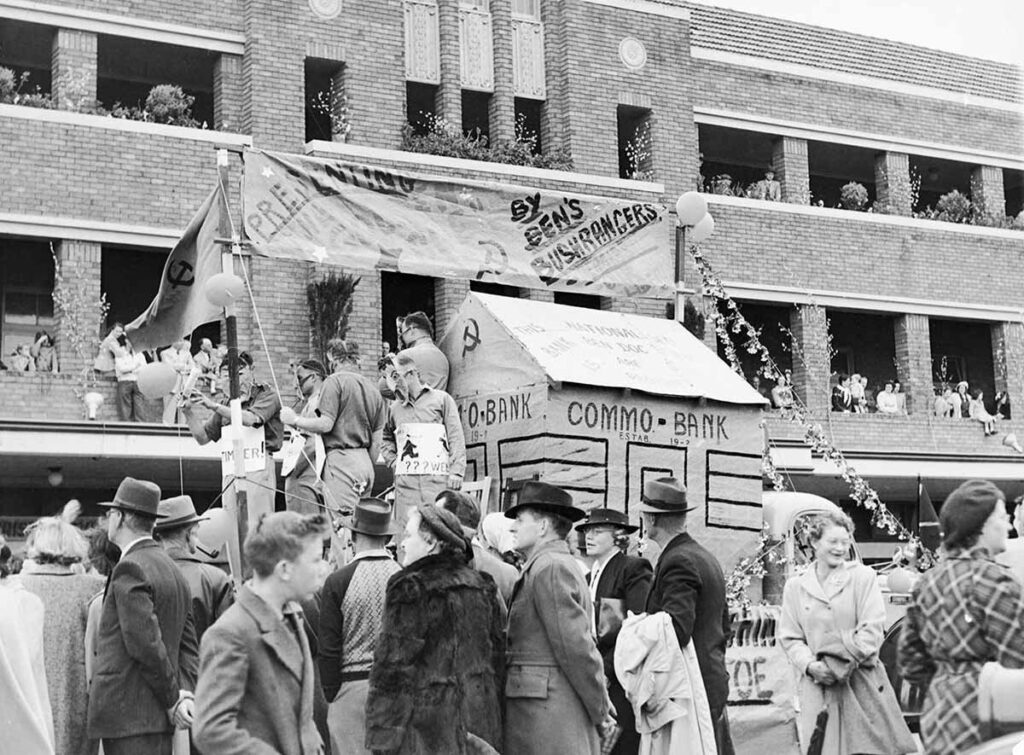On this day, 15 October 1947, the Chifley Government introduces the Bank Nationalisation Bill to Federal Parliament. The Bill will be a fundamental turning point in Australian political history, helping to galvanise a fledgling Liberal Party that had fared poorly at its first election, entrenching Robert Menzies’s leadership of that party, and playing a major role in Labor’s 1949 electoral defeat, which ensured Australia’s post-war trajectory would not go down the same state-dependent path as the United Kingdom.
The Bank Nationalisation Bill had a long pre-history stemming from the Labor movement’s deep ideological distrust of the banks as ‘money power’, the role they felt that the banks had played in the Great Depression, and the need they saw for the government to directly control the economy as part of their grand plans for post-war reconstruction. Since 1921 the ‘socialist objective’ in the Labor Party’s platform had advocated for a broad range of nationalisations, as had previous iterations of the ‘socialist objective’ in both state and federal platforms, but these ‘objectives’ had always been more of an ideological totem than a clear-cut political program.
In March 1945 ‘based on the conviction that the Government must accept responsibility for the economic condition of the nation’, the Curtin Government had introduced legislation to continue wartime controls on private banks, consolidate the Commonwealth Bank’s role as a central bank and replace the Bank’s board with a single governor and an advisory board of officials. In August 1947 the High Court ruled in favour of a Melbourne City Council claim against a section of the 1945 legislation forcing all government and semi-government bodies to conduct their business with the government-owned Commonwealth Bank.
Fearful that this decision would undermine the legislation and embolden the private banks to challenge it further, the Chifley Government decided almost spontaneously to pre-empt such a challenge by nationalising the banks, carrying out a key aspect of the socialist objective. Ben Chifley informed the nation of his decision via a 42-word announcement lacking any clear justification or explanation, the whole thing came as a bolt from the blue to the public.
The centre-right of Australian politics had been warning the public of the dangers of Labor’s socialist objective since at least George Reid’s famous Anti-Socialist Campaign of 1905-6, and now they finally had the ‘proof’ that Labor fully intended to carry it out. The geopolitical context added fuel to these fears, as the Cold War was emerging the line between socialism and communism was inevitably seen as blurry.
This all came as a godsend to Robert Menzies, whose leadership of the Liberal Party he had helped to found was then on quite shaky ground. He boldly declared that having just won a war against fascism, Australians ‘were now called to a great battle to defend their freedoms against dictatorship at home’. Buoyed with enthusiasm, Menzies even resigned his position as leader in order to prompt the Liberal Party to unanimously re-elect him, entrenching him in the position he would hold for almost another two-decades.
Menzies gave numerous speeches at large gatherings on the issue, but it was not just the Liberal Party which came out in opposition. People banking with the private banks felt their independence and choice was being robbed from them, and chief amongst the aggrieved were the employees of the private banks themselves. The United Bank Officers’ Association gathered a crowd of 10,000 at a protest in Sydney, while petitions with ‘hundreds of thousands of signatures’ were sent to Canberra.
Labor had the numbers to get the Bill through Parliament, but Menzies was able to use the debate to defend the merits of private enterprise and attack Chifley’s proposition that banks run for profit ‘in important respects run counter to the public interest’ as an argument in favour of eliminating the private economy in general. The banks lodged a legal appeal immediately as the new Act received royal assent, securing a High Court injunction that meant it never went into effect. It was overturned the next year for being unconstitutional.
Nevertheless, Labor defiantly left the Act on the statute books and the damage to their reputation had been done. Menzies would win the 1949 election in a landslide, campaigning on the same central premise of private enterprise over state control on issues like petrol rationing and lifting wartime restrictions. It would be an epoch defining result.
Further Reading:
A.W. Martin, Robert Menzies, A Life Volume 2 1944-1978 (Melbourne University Press, 1999).
L.F. Crisp, Ben Chifley: A Political Biography (Longmans, 1960).
Norman Abjorensen, ‘Chifley Versus the Banks’, Australian Society for the Study of Labor History, 2017.
Sign up to our newsletter
Sign up for our monthly newsletter to hear the latest news and receive information about upcoming events.


